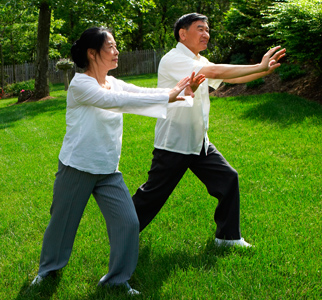Tai Chi May Work Well for Knee Arthritis
Knee pain and stiffness are common when you have osteoarthritis of the knee. Physical therapy and medicines can help ease those symptoms—as can the martial art tai chi.

Tai chi is known for its slow, graceful movements. A recent study found that the ancient Chinese exercise worked as well as physical therapy to help relieve symptoms of osteoarthritis. It also helped ease depression.
Knee osteoarthritis is more common in older adults who are overweight. The knee cartilage that cushions the joint wears away with use and time. This causes pain, swelling, tenderness, and stiffness. Treatment is usually either physical therapy or anti-inflammatory medicines, or both.
Older adults
Researchers at Tufts Medical Center in Boston followed 200 older adults. Their average age was 60. Most were overweight or obese and had had osteoarthritis of the knee for about 8 years.
The people in the study were given either physical therapy or tai chi for 12 weeks. The group that did tai chi were led by an instructor. Those that got physical therapy did that twice a week for 6 weeks. They then continued the PT at home for another 6 weeks.
Everyone in the study could take pain relievers as needed, and could see their healthcare provider for routine visits.
The researchers found that both the PT group and the tai chi group showed about the same amount of improvement in symptoms. Those improvements lasted for up to a year. But the tai chi group also had less depression than those who had PT.
Mind-body work
Tai chi includes deep breathing and relaxation, along with the slow movements. Past studies have shown that tai chi can help improve sleep and reduce stress, anxiety, and depression.
"Tai chi is a particularly appealing form of exercise,” said Matthew Hepinstall, MD. “It is very low impact and emphasizes balance, coordination and strength." Hepinstall is an orthopedic surgeon in New York City who was not involved in the study.
Tai chi is easy to learn and do, said Chenchen Wang, MD, study author. She recommended that older adults get training from an experienced instructor. A local gym or athletic club might be able to recommend a teacher.
|
Read more about osteoarthritis.
|